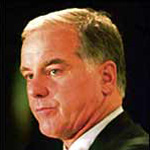By Shay Totten
Published March 11th 2009 in Seven Days
Another Town Meeting Tuesday, another set of election results arriving too late for the “Fair Game” column. You think elections could be held on Sunday or Monday to give Seven Days time to write about them in Wednesday’s paper? Just an idea.
Action on Republican Kurt Wright’s recount request in the Burlington mayoral election is getting underway as this week’s issue goes to press, so I hope to be delivering the news on the Seven Days staff blog, Blurt, by Wednesday night.
While the recount isn’t likely to change the outcome, it may answer this question: What the hell were Burlington voters thinking by reelecting Progressive Bob Kiss?
State GOP Chairman Rob Roper pulled no punches on Vermont Public Radio: “I think that what happened in Burlington on Tuesday was a travesty, and I think the will of the voters was circumvented.”
Preach on, brother. A travesty, indeed. Let’s review:
-Two-thirds of the voters didn’t have the smarts to put Wright down as their first pick.
-Five out of seven wards ranked Wright behind Kiss and Democrat Andy Montroll.
-Kiss was in the lead, claiming the most first-place votes in only six of seven wards, before Ward 7 voters pushed Wright out front.
-Wright had 33 percent after the first round, 37 percent after round two. That’s close enough to 50 percent, isn’t it?
See how our will was circumvented? What was in those brownies at the polling site bake sales?
Let’s examine the math behind this circumvention: In the first round, Wright had 2951 (33 percent) votes to Kiss’ 2585 (29 percent) and Montroll’s 2063 (23 percent). In the second round, Wright had 3294 (37 percent) to Kiss’ 2981 (34 percent) and Montroll’s 2554 (29 percent) after Independent Dan Smith and Green Party candidate James Simpson’s votes were eliminated and their second preferences divvied up among the other three candidates. In the final round, Montroll was eliminated: 1332 of his preferences went to Kiss, while 767 went to Wright. That put Kiss on top with 4313 (51.5 percent) and Wright with 4061 (48 percent).
The outcome inspired a T-shirt offering a new definition of IRV: “Keep Counting ’Til Bob Wins.”
Given this info, it does appear those pesky Montroll and Smith supporters mucked things up by ranking Kiss before Wright on their ballot. What losers.
Seriously, in a liberal city where you had three candidates pulling votes from the left, and two from the right, IRV worked as intended. It gave voters a chance to rank their candidates: The one preferred by 50 percent of the electorate ends up the winner — you know, a majority.
With four competent candidates, it was sure to take a few rounds.
As mayoral spokesman Joe Reinert aptly described it: “This was not a one-lap race, or a two-lap race; it was a three-lap race, and as such all that matters is who was ahead after three laps.”
The race may not be over yet.
Anti-IRV forces are already at work to ensure the voting system is not used in state elections, and there is talk of recalling IRV in Burlington.
Wright is the poster child for dumping IRV and has been urged to lead the citizen petition effort to do so. “Citizens voted for IRV and if they choose to get rid of it, that process should be citizen-driven, too, and not encouraged by me,” he said. Wink, wink, nudge, nudge.
Word is, the Vermont GOP may file a lawsuit to make sure the will of Burlington voters is upheld. You know, voters who really meant to vote for Wright.
“A close election can create some controversy,” said Rob Richie, executive director of FairVote, a pro-IRV group that helped Burlington set up the ranking system in 2006. “I think IRV comes out of this smelling like roses if you step away from a partisan analysis and just look at the kind of campaign it helped generate, the way voters handled it, and the more democratic outcome it produced.”
A partisan analysis? In Burlington? Now, that’s silly.
Action on Republican Kurt Wright’s recount request in the Burlington mayoral election is getting underway as this week’s issue goes to press, so I hope to be delivering the news on the Seven Days staff blog, Blurt, by Wednesday night.
While the recount isn’t likely to change the outcome, it may answer this question: What the hell were Burlington voters thinking by reelecting Progressive Bob Kiss?
State GOP Chairman Rob Roper pulled no punches on Vermont Public Radio: “I think that what happened in Burlington on Tuesday was a travesty, and I think the will of the voters was circumvented.”
Preach on, brother. A travesty, indeed. Let’s review:
-Two-thirds of the voters didn’t have the smarts to put Wright down as their first pick.
-Five out of seven wards ranked Wright behind Kiss and Democrat Andy Montroll.
-Kiss was in the lead, claiming the most first-place votes in only six of seven wards, before Ward 7 voters pushed Wright out front.
-Wright had 33 percent after the first round, 37 percent after round two. That’s close enough to 50 percent, isn’t it?
See how our will was circumvented? What was in those brownies at the polling site bake sales?
Let’s examine the math behind this circumvention: In the first round, Wright had 2951 (33 percent) votes to Kiss’ 2585 (29 percent) and Montroll’s 2063 (23 percent). In the second round, Wright had 3294 (37 percent) to Kiss’ 2981 (34 percent) and Montroll’s 2554 (29 percent) after Independent Dan Smith and Green Party candidate James Simpson’s votes were eliminated and their second preferences divvied up among the other three candidates. In the final round, Montroll was eliminated: 1332 of his preferences went to Kiss, while 767 went to Wright. That put Kiss on top with 4313 (51.5 percent) and Wright with 4061 (48 percent).
The outcome inspired a T-shirt offering a new definition of IRV: “Keep Counting ’Til Bob Wins.”
Given this info, it does appear those pesky Montroll and Smith supporters mucked things up by ranking Kiss before Wright on their ballot. What losers.
Seriously, in a liberal city where you had three candidates pulling votes from the left, and two from the right, IRV worked as intended. It gave voters a chance to rank their candidates: The one preferred by 50 percent of the electorate ends up the winner — you know, a majority.
With four competent candidates, it was sure to take a few rounds.
As mayoral spokesman Joe Reinert aptly described it: “This was not a one-lap race, or a two-lap race; it was a three-lap race, and as such all that matters is who was ahead after three laps.”
The race may not be over yet.
Anti-IRV forces are already at work to ensure the voting system is not used in state elections, and there is talk of recalling IRV in Burlington.
Wright is the poster child for dumping IRV and has been urged to lead the citizen petition effort to do so. “Citizens voted for IRV and if they choose to get rid of it, that process should be citizen-driven, too, and not encouraged by me,” he said. Wink, wink, nudge, nudge.
Word is, the Vermont GOP may file a lawsuit to make sure the will of Burlington voters is upheld. You know, voters who really meant to vote for Wright.
“A close election can create some controversy,” said Rob Richie, executive director of FairVote, a pro-IRV group that helped Burlington set up the ranking system in 2006. “I think IRV comes out of this smelling like roses if you step away from a partisan analysis and just look at the kind of campaign it helped generate, the way voters handled it, and the more democratic outcome it produced.”
A partisan analysis? In Burlington? Now, that’s silly.
 On March 16th, Former Vermont Governor and Democratic National Committee Chair Howard Dean continued his support for instant runoff voting on Vermont Radio's Mark Johnson Show. Commenting on Burlington's recent IRV election, Dean said "I think the best and most democratic way to use to elect people in multiparty elections is instant runoff voting." Dean also supported the system when it was first used in Burlington in 2006.
On March 16th, Former Vermont Governor and Democratic National Committee Chair Howard Dean continued his support for instant runoff voting on Vermont Radio's Mark Johnson Show. Commenting on Burlington's recent IRV election, Dean said "I think the best and most democratic way to use to elect people in multiparty elections is instant runoff voting." Dean also supported the system when it was first used in Burlington in 2006. Citizens of Burlington, Vermont went to the polls on Tuesday, March 3rd to vote for the second time in an election using instant runoff voting. At 8:25 PM, the city declared that incumbent Mayor Bob Kiss had won reelection in the third and final round of counting, narrowly edging out challenger Kurt Wright, 51.5% to 48.5%. The race was unique in that it had four candidates that had a legitimate shot at winning: Progressive Kiss, Republican Wright, Democrat Andy Montroll, and independent Dan Smith. In most other American cities, there would be fear of "spoiler" candidates, but IRV allowed all four candidates to run without having to worry about being labeled "spoilers."
Citizens of Burlington, Vermont went to the polls on Tuesday, March 3rd to vote for the second time in an election using instant runoff voting. At 8:25 PM, the city declared that incumbent Mayor Bob Kiss had won reelection in the third and final round of counting, narrowly edging out challenger Kurt Wright, 51.5% to 48.5%. The race was unique in that it had four candidates that had a legitimate shot at winning: Progressive Kiss, Republican Wright, Democrat Andy Montroll, and independent Dan Smith. In most other American cities, there would be fear of "spoiler" candidates, but IRV allowed all four candidates to run without having to worry about being labeled "spoilers." On April 4, Vermont governor Jim Douglas chose to veto legislation to re-establish majority elections for Congress in his state through instant runoff voting. Vermont would have been the first state to enact IRV for Congress; legislative leaders affirmed their commitment to the bill, and it is sure to move in the state again. FairVote has worked hard to support this legislation, which likely generated more than 600 phone calls to the governor from Vermonters.
On April 4, Vermont governor Jim Douglas chose to veto legislation to re-establish majority elections for Congress in his state through instant runoff voting. Vermont would have been the first state to enact IRV for Congress; legislative leaders affirmed their commitment to the bill, and it is sure to move in the state again. FairVote has worked hard to support this legislation, which likely generated more than 600 phone calls to the governor from Vermonters.